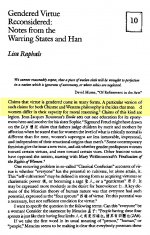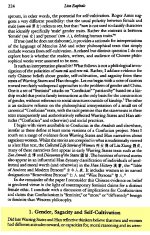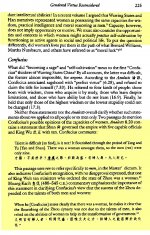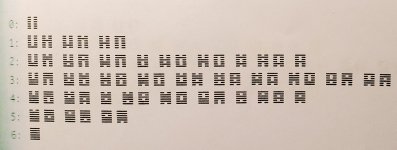Clarity,
Office 17622,
PO Box 6945,
London.
W1A 6US
United Kingdom
Phone/ Voicemail:
+44 (0)20 3287 3053 (UK)
+1 (561) 459-4758 (US).

So, all of a sudden, the powerful woman becomes the "inferior thing that seems so harmless and inviting," a symbolic representation of the inferior man.
So it is again yang who is the inspiring force in this dance towards 'coming off the wagon'. Yin sees the gap made available (the strong and light-giving element had not in turn come half way.) by yang stepping back and yin is now thrust into activity, following the new lead.The inferior man rises only because the superior man does not regard him as dangerous, and so lends him power. If he were resisted from the first, he could never gain influence.
So here, without the use of any pronoun, is confirmation that when in 44 yin is drawn into action it becomes strong and focussed on manifesting that which yang has initiated. In this situation yin is one tough cookie to contend with.Yin is the most gentle and submissive; when put in motion it is strong and firm.
Yin is the most quiet and still; when taking action, it is able to reach a definite goal.
That would indeed be a great interpretation to an inquiry related to addiction. And it made me reflect a bit more on Wilhelm's commentary. There is something a bit subversive about it. You could see it as a warning about regarding the powerful woman as something weak and submissive. If you go on thinking about her like that, if you think you can control her, you're in for a sorry surprise.I can liken these words by Wilhelm of 44 to a situation of an alcoholic who having just increased his resolve (43) to give up the drink is being challenged by his addiction to just have one small drink. Resting on the new found virtue ( the danger expressed in IrfanK's quote) that has been won so far there is a waver......'Surely, just one drink will be alright. That's all I need to take the edge off my craving'.
The old craving will never leave. It will over time become less prevalent. Marrying it now will only lead to disaster.
The trouble here as Wilhelm goes on to say is
So it is again yang who is the inspiring force in this dance towards 'coming off the wagon'. Yin sees the gap made available (the strong and light-giving element had not in turn come half way.) by yang stepping back and yin is now thrust into activity, following the new lead.
Huang reports that that one of the commentaries states
So here, without the use of any pronoun, is confirmation that when in 44 yin is drawn into action it becomes strong and focussed on manifesting that which yang has initiated. In this situation yin is one tough cookie to contend with.

Yes, Wilhelm's commentary leaves, for me, much to be desired at times. Especially when in 44 it looks like there is a strong case that it's all down to yang and the superior man not recognising that the inferior man is flexing his muscles and is dangerous.That would indeed be a great interpretation to an inquiry related to addiction. And it made me reflect a bit more on Wilhelm's commentary. There is something a bit subversive about it. You could see it as a warning about regarding the powerful woman as something weak and submissive. If you go on thinking about her like that, if you think you can control her, you're in for a sorry surprise.
Hmmm. Maybe I should look at 37 again, too.
37.2 She should not folly her whims. She must attend within to the food. Perseverance brings good fortune.
37.4 She is the treasure of the house. Great good fortune.
View attachment 4615
Here, though, Huang paints a picture of "the ideal place for a housewife" i.e. being at the centre of nurturing all things. That, he says, is due to her docility and gentleness and that there is good fortune in this line."The wife must always be guided by the will of the master of the house, be he father, husband, or grown son."
I don't think it's mostly about the Wilhelm's own attitudes. He was a good and faithful servant who tried to describe a particular interpretive tradition, one which had prevailed in the imperial court for about 1000 years, since the Song dynasty. I remember Harmen Mesker saying that some of his commentaries are basically a direct translation, or a very close paraphrase, of one particular book that was considered to be the standard reference on the Yi for centuries, written sometime in .... 16th century? I forget, it's all in Smith's The I Ching: A Biography. It wasn't the the only tradition that existed, there were all sorts of folk traditions and regional traditions as well, but it was pretty influential and carried a lot of prestige, being associated with the Chinese royal court.Yes, Wilhelm's commentary leaves, for me, much to be desired at times. Especially when in 44 it looks like there is a strong case that it's all down to yang and the superior man not recognising that the inferior man is flexing his muscles and is dangerous.
Going back to basics Wilhelm's commentary on Hex 2 states " there is a clearly defined hierarchic relationship between the two principles" and later confirms " the Receptive is just as important as the Creative" and that " the Reactive must be activated and led by the Creative; then it is productive of good. Only when it abandons this position and tries to stand as an equal side by side with the Creative, does it become evil".
Now that's the kicker that I think contributed to much of the bad press printed around yin as many people down the ages do not full appreciate what evil is or what yin is.
Modern day perspectives around the differences of leadership (innovation and ethical actions that promote personal development) and management ( based in organisation and hierarchical communication chains of command). Management works top down; leadership works bottom up / centre out. The latter being more like plant a seed and support it's growth. Wilhelm in his time, I do not imagine, was exposed to these modern day perspectives. If he had been he would have known that the qualities of leading and following are becoming less commonly viewed in modern forward-looking organisations as in any way hierarchical.
In general, Huang's commentary carries a much softer tone as he explores the Tao of Heaven and the Tao of Earth.
Wilhelm's opening sentence of his commentary of 37.2 clearly comes as being of his time and rooted in Chinese cultural views,
Here, though, Huang paints a picture of "the ideal place for a housewife" i.e. being at the centre of nurturing all things. That, he says, is due to her docility and gentleness and that there is good fortune in this line.
So having had a good influence at the centre of the inner household (37.2) at 37.4 these influences spread out over the threshold and into the outer world."The one at this place is gentle and modest, she is able to walk in the central path and thus enrich the household. There is great good fortune."
Nothing evil in any of this. Yes, if yin is unable to fulfil it's appointed role then there is likely to be disharmony, just the same as if yang doesn't.
My perspective is that if people are looking for a balanced write up of the yin principle then Wilhelm is not the best reference to pore over. At the very least it needs to be read in conjunction with other texts,
As @charly insinuated, it's quite possible to look at the Yi without even thinking about yin and yang. It's not really integral to the Yi, it's an idea that emerged about a thousand years after it was written. Probably. Who knows? But there's certainly no explicit mention of them in the Zhouyi itself. People have developed -- and are continuing to develop -- all sorts of ideas to try to understand it. Be interesting to see how people see it in 3022 AD.My perspective is that if people are looking for a balanced write up of the yin principle then Wilhelm is not the best reference to pore over. At the very least it needs to be read in conjunction with other texts,
It's another whole story from the I Ching's view on females (if it was about the survival, then the female who gives birth & nurtures the children should have occupied a high place which isn't the case).(? today female can do all of that as well, thank's to "industrial wonders")
You and Mr Key discuss about examples of the hamulating view the I Ching (Wilhelm commentary?) has on females.I wonder if Mary and the other women on this forum are even following this now? Haha. Funny. No criticism intended, either of myself or anyone else. But we men seem to have taken over this thread, haven't we? Well, that's the way things go.

Yes, he is. Also his work is still, for me, insightful and informative, partly because he has been such a faithful follower of the received text and associated wings.I don't think it's mostly about the Wilhelm's own attitudes. He was a good and faithful servant who tried to describe a particular interpretive tradition, one which had prevailed in the imperial court for about 1000 years, since the Song dynasty.
It's important to let the alchemical juices flow.So, Wilhelm is great for understanding how the Yi has been seen by a large number of users for about a thousand years. Then you need to read a bit on the context critics take on the bronze age, just to challenge all that a bit. Then add in a few late 20th and 21st century commentators, preferably including a few women who view the tradition with a critical eye. Hilary, for example. Then you sit back and realize that it's all still murky, but at least its a bigger, richer murk than before.
I see threads as akin to conversation. Sometimes there are things to be said and at other times the urge to be silent and listen becomes more prevalent.PS. Haha. I'm just sitting back, reflecting that it's me, my_key, and Charly that seem to be taking up this discussion and analyzing it. I wonder if Mary and the other women on this forum are even following this now? Haha. Funny. No criticism intended, either of myself or anyone else. But we men seem to have taken over this thread, haven't we? Well, that's the way things go.
Hi Irfan:... Hmmm. Maybe I should look at 37 again, too.
37.2 She should not folly her whims. She must attend within to the food. Perseverance brings good fortune.
37.4 She is the treasure of the house. Great good fortune.
Quoting Lisa Raphals:For those interested in women´s roles in times of early Western Zhou I advise to read LisaRaphals: «Gendered Virtue Reconsidered. Notes from the Warring States and Han», chapter 10 of «The Sage and the Second Sex».
Regretably there is no preview in Google Books.
Will try to find some quotes.
Ch.



«Neither these statements nor the Analects overall clarify whether such state ments about ren applied to all people or to men only. Two passages do mention Confucius’s possible opinions of the capacities o f women. Analects 8.20 contains a statement that Shun governed the empire with five capable officials and King Wu with ten.
Confucius comments:
Talent is difficult [to find], is it not! It flourished through the period of Tang and Yu [Yao and Shun]. There was a woman amongst them, so the men (ren) were only nine.
This passage uses ren to refer specifically to men, in the Master’s dictum. It also indicates Confucius’s recognition, with no disapproval expressed, that one of King Wu’s ten ministers who ordered the state of Zhou was a woman.
Huang Kan’s (488-545 c.e.) commentary emphasizes the importance of this statement in clarifying Confucius’s view that the success of the Zhou depended on the talents of both men and women:
When he [Confucius] states clearly that there was a woman, he makes it clear that the flourishing of the Zhou dynasty was not due to the talents of men, it also relied on the abilities of women to help in the transformation of government.
Hi Irfan:... Come to think of it, I've met small indigenous communities in Indonesia where cooking falls into the category of men's work. Mind you, they still have very strong gender categories, and women don't always get the best end of the deal. But cooking isn't their job. No reason to assume that it would have been during the Zhou era, either. Possibly, possibly not.
Hi, Sven:Hi, searching for another thing I found this on Joel Biroco's site:
http://www.ruf.rice.edu/~asia/WomenAndDivination.html
__________________
% Add., I think it's a bit more readable in the PDF attached
Hi Mary:... Be happy that you men took over the thread. That's the way things should go in an I Ching forum. Then what? Should I be happy because Wilhelm said that the wife should ignore her own desires and cooks food?
I can't see what you're sad with. I do follow the discussion but have nothing to add.
Another sign that things may have been different in ancient times. Even there may have been ages we don't know about yet.Consequently, the ZHOUYI, say the statements and the lines, seems almost devoid of misogyny, while the much later commentarial tradition seems just the opposite.
One of the things I get from all this discussion is not so much that the I Ching started off without gender bias and misogyny and then got misinterpreted, but that its meaning has continued to change over the centuries and millenia. If you approach it with a misogynistic attitude and beliefs, it will give you misogynistic answers. If you start off with a different view of relations between men and women, then you will see what it says differently.Another sign that things may have been different in ancient times. Even there may have been ages we don't know about yet.
We are about to enter the Aquarius era & I wonder how the things have been pre-Pisces era.

Can you explain more?If you approach it with a misogynistic attitude and beliefs, it will give you misogynistic answers. If you start off with a different view of relations between men and women, then you will see what it says differently.
Well, people in the Song dynasty seem to have been generally a bit misogynistic. They didn't really trust women and they thought they should be kept away from public life. So when they used the I Ching, that's how they interpreted what it said.Can you explain more?
I'm not sure I agree with you.
Hi Radiofreewill:With regard to gender and the i-Ching, I tend to agree with many here that the addition of the ten wings undoubtedly put the anachronistic stamp of Confucian Patriarchy on the received text, thereby obscuring any earlier Zhou-era understandings of gender that would have been part of the book's original construction?
...
However, once Confucius enveloped the Zhouyi in his Warring States Patriarchy and called it the i-Ching, it lost any subtlety that the Zhou may have known in their own time.
So, on the "Women and the i-Ching" issue, I'm suggesting that the Yin Tyrant is the straw dog for everything evil ~ corruption that multiplies ~ in the Zhouyi...
...but, but, but, once the Zhouyi got into the hands of Confucius, he used it to conflate the Conquest of the evil Yin Tyrant, in the name of God...
...with subjugating the female gender, in the name of Patriarchy!
...
| The Master said, "Of all people, girls and servants are the most difficult to behave to. If you are familiar with them, they lose their humility. If you maintain a reserve towards them, they are discontented." [Source:CTEXT.ORG] |
|
Clarity,
Office 17622,
PO Box 6945,
London.
W1A 6US
United Kingdom
Phone/ Voicemail:
+44 (0)20 3287 3053 (UK)
+1 (561) 459-4758 (US).